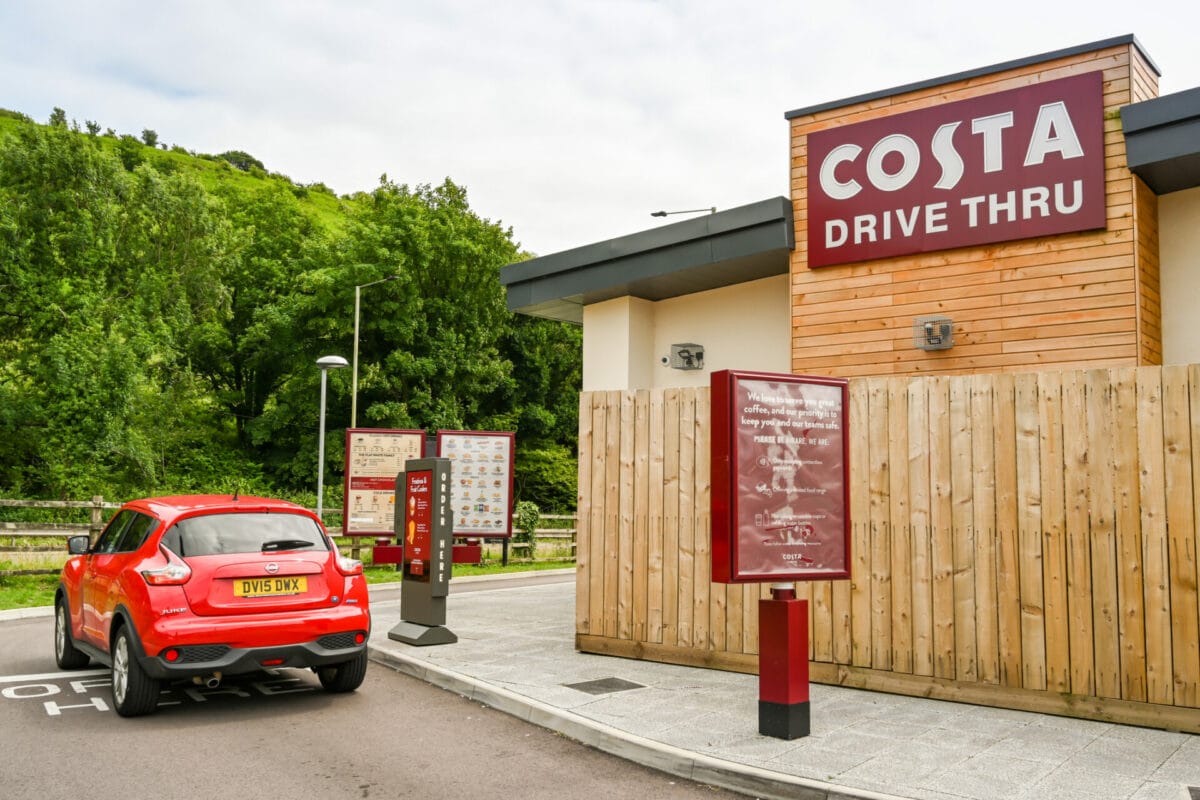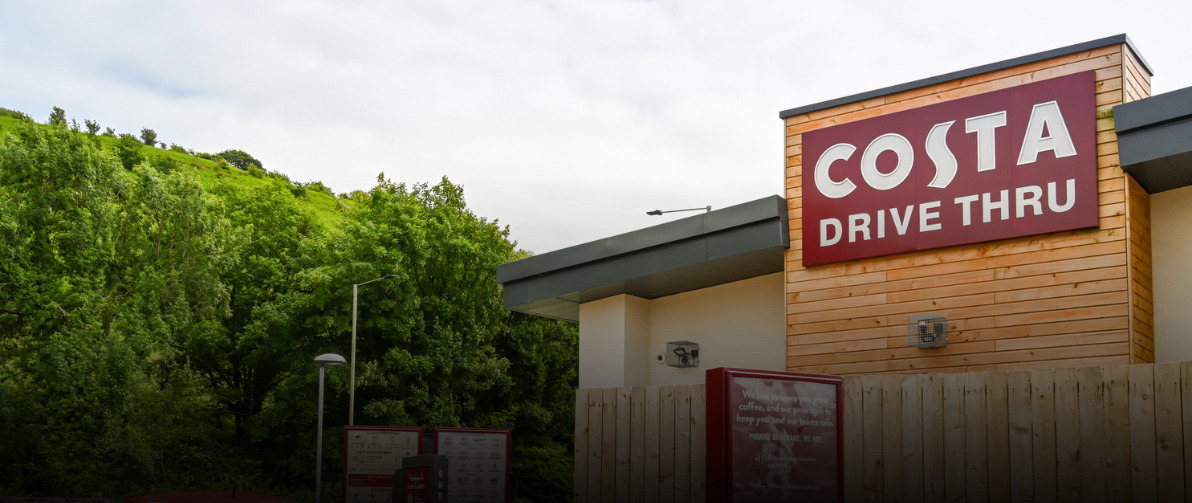Coffee giant Costa wanted to help write Scottish Government guidelines on the future of drive-through restaurants, sparking concerns about lobbyists’ efforts to weaken new planning rules.
Scotland’s new national planning framework, called NPF4, includes tough restrictions on the building of new drive-throughs, which will only go ahead in areas where they are explicitly backed by local councils. The new rules are aimed at reducing climate emissions from car use and tackling climate change.
Freedom of information (FoI) responses received by The Ferret have shown that Costa was unhappy with the new rules, warning the government they would “significantly limit” the building of drive-throughs.
The coffee chain – which owns numerous drive-through shops in Scotland – added there was “potential for indecision” on new and ongoing applications as councils adapt to the national framework, which could take around five years.
Costa offered to help the government write a “working draft” of guidance to steer planning decisions on drive-throughs over the transitional five-year period. The government refused the company’s offer, but expressed “regret” that it was unable to share a copy of the guidance “for further drafting changes” because it was about to be published.
Environmental campaigners said it was “outrageous that Costa thought they might be allowed to help draft the rules that will apply to them in future”.
The Scottish Government said “stakeholders do not draft” any of its guidance “but their input is welcome” and it engages “appropriately with them”.
It is outrageous that Costa thought that they might be allowed to help draft the rules that will apply to them in future.
Richard Dixon, former director of Friends of the Earth Scotland
Some green activists commended the government for pushing back against lobbying. However, one Scottish Labour MSP said the fact the government expressed “regret” at its inability to take up Costa’s offer “begs the question of whether this interference is commonplace when drafting and determining public policy”.
Costa claimed it made the offer so that the guidance “fairly reflected the environmental, economic and social contribution made by drive-through developments”. The company told The Ferret it was “strongly supportive” of efforts to “improve environmental outcomes” across Scotland.
The NPF4 planning framework was adopted by ministers in February. It will influence all planning decisions across the country. One of its key aims is to help Scotland achieve its goal of reaching net-zero climate emissions by 2045.
Transport is currently the country’s biggest source of emissions and there are fears that allowing more drive-throughs will encourage car use and make it more difficult to achieve climate targets. Scotland’s climate plan includes a commitment to reducing car travel by 20 per cent by 2030.
Yet NPF4’s stricter rules on drive-throughs come at a time when the sector is growing massively. There are now more than 2,200 drive-throughs in the UK as a whole, and the number increased by 41 per cent in just five years between 2015 and 2020.
This growth is partly a result of more shops – including Costa – entering the drive-through market to compensate for reduced footfall in city centres.
In Scotland, applications for two new McDonalds drive-throughs – in Ellon in the north east and Larkhall in South Lanarkshire – were lodged last month alone.
That response begs the question of whether this interference is commonplace when drafting and determining public policy.
Paul Sweeney MSP, Scottish Labour
The spike in drive-throughs has faced mounting criticism, particularly in Glasgow, which has nearly 50 of them – more than Edinburgh, Dundee and Aberdeen combined.
Opposition centres on the climate impacts of car use – which drive-throughs are seen to encourage – as well as the fact that engine idling at them can cause harmful air pollution which damages human health.
Retailers have also been criticised for opening drive-throughs in areas with low car ownership, meaning they deliver few benefits to local communities.
NPF4 states that drive-throughs will only be built in locations where they are “specifically supported” by an area’s local development plan (LDP), which is set by its council.
But councils are not expected to implement new LDPs – which take NPF4 into account – for up to five years, posing questions about how planning decisions will be made in the meantime.
After receiving a letter from Costa criticising the policy on drive-throughs in December 2022, Holyrood’s then-planning minister, Tom Arthur, told the company at a meeting on 26 January 2023 that transitional guidance to deal with this problem would be published “imminently”.
In an email after that meeting, sent on 30 January, Costa said it “wanted to understand if there was a working draft of the transitional guidance” that it “could support with developing”. It added it would welcome “the chance to feed into the drafting process”.
A government official replied on 7 February noting the guidance was being published “very soon, so I regret we were unable to share the text for further drafting changes”. However, they assured the company that the government was “stressing the point about it not being an outright ban” on drive-throughs, as had been reported in the media.
The transitional guidance was published the next day and noted that new planning rules were “not (as erroneously reported) a moratorium or ban” on drive-throughs.

Scottish Labour MSP, Paul Sweeney – who is among a host of objectors to a new Starbucks drive-through in Glasgow’s Gorbals area – criticised the Scottish Government’s handling of Costa’s request.
“It is right and proper that during a climate emergency there is a presumption against drive-through restaurants and it is incredible that the Scottish Government’s response to these lobbying attempts was to express regret at their inability to take up their offer,” Sweeney said.
“That response is a real concern and begs the question of whether this interference is commonplace when drafting and determining public policy,” he added.
Former director of Friends of the Earth Scotland, Dr Richard Dixon, argued that while consultation with polluting companies was understandable, firms should “obviously never be allowed to actually write their own rules”.
Dixon added: “It is outrageous that Costa thought that they might be allowed to help draft the rules that will apply to them in future.
“Well done to the Scottish Government for rejecting this offer but the rejection seems to have been only because the drafting was at a late stage rather than a proper objection in principle. This makes you wonder if officials are letting other business interests help draw up the rules that will apply to them.”
Kat Jones, director of the campaign group, Action to Protect Rural Scotland, told The Ferret it was “extremely concerning” that Costa was lobbying to “amend planning laws in their own favour, and in direct opposition to Scotland’s own commitments to reduce emissions and car use”.
“These facilities are often imposed on communities where few people have cars, inflicting worse air quality and more crowded streets on them for no benefit,” Jones claimed. “Drive-throughs are a blight on local communities who desperately need investment that creates walkable, livable and sustainable communities.
“Planning law is key to how Scotland responds to the climate crisis and multi-million-pound companies should not be trying to put shareholder value ahead of livable communities, decarbonisation, and democracy.”
Drive-throughs are a blight on local communities who desperately need investment that creates walkable, livable and sustainable communities.
Kat Jones, Action to Protect Rural Scotland
A Scottish Government spokesperson said: “Stakeholders do not draft Scottish Government guidance, but their input is welcome and we engage appropriately with them.
“The then-planning minister Tom Arthur listened to Costa Coffee’s views on new national planning policy on drive-through developments and how these could be designed to be compatible with climate and transport targets.
“Following our consultation on National Planning Framework 4, which proposed restricting drive-throughs in out-of-town locations, the policy was widened. As we have made clear, this is not an outright ban on drive-throughs, but instead focuses on a planned approach to delivering the right developments in the right places.”
Costa’s lobbying on drive-throughs was part of a wider pushback by the company against Scottish regulations revealed by the FoI responses. The company also raised wider issues with government regulation at a meeting between Arthur and members of the Scottish Retail Consortium on 11 January.
According to minutes, a Costa official told the meeting “regulation can result in bias against Scotland when making investment due to cost impacts”.
The minutes said: “Costa currently opens 20 new stores a year in the UK, creating on average 15 new jobs per store and would like a 50/50 split between Scotland and England but are concerned that won’t be possible as a result of Scottish regulations.”
A Costa spokesperson said: “Costa Coffee are proud to operate hundreds of stores and employ thousands of people across Scotland. We are strongly supportive of the Scottish Government’s efforts to improve environmental outcomes across the country.
“We all want to see positive environmental outcomes across Scotland, and we welcomed the clarification set out by the minister regarding drive-through developments.
“Our offer to support was to help provide guidance that fairly reflected the environmental, economic, and social contribution made by drive-through developments, and the integral part they play in creating a thriving retail and leisure sector in communities across Scotland.”
Images: iStock/Ceri Breeze














